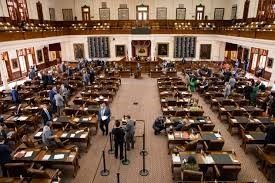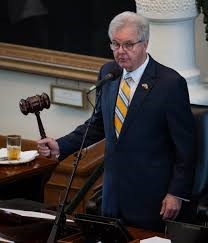
Here’s a quick recap of what happened over the last week:
Special Session Update

The House met Thursday with four bills on their calendar. The House first passed Senate Bill 7, which prohibits private employers of any size in the state from requiring COVID vaccine mandates for their employees. And, with an amendment added on the floor, mandates that violators are subject to a $50,000 fine for violating the provisions of the bill. The bill also prohibits private employers from mandating the vaccine to any contract employees with whom they conduct business. Enforcement would be handled through employee complaints with the Texas Workforce Commission. The debate showcased not only the merits of the vaccine, but also the impact of government intervention on the rights of business owners and individuals. In the end, the bill passed along party lines with the Republicans disregarding argument by many business owners that this mandate infringes on their right to make their own policy decisions. The bill now heads to the Senate where they will decide whether to accept the House amendments or go to a conference committee.
The House then passed Senate Bill 4, which increases the penalty for persons convicted of human smuggling or operating a stash house – defined as the use of a house for something or than habitation – to a second degree felony in an effort to further curb the influence and activities of the cartels exploiting the massive influx of migrants attempting to cross the border. This bill also largely passed along party lines with Democrats arguing the definitions for “smuggling” are too vague in the bill and the penalties set forth in the bill are too harsh. The bill was not amended in the House so now goes to Gov. Abbott for his consideration.
The House then passed House Bill 6 which will appropriate another $1.5 billion to continue building the border wall. This would double the amount that has already been appropriated specifically for construction of the wall. Over the last two years, the legislature has appropriated roughly $4.5 billion for measures related to border security. That is in addition to the $5 billion that was approved during the regular session for the upcoming biennium. If the latest proposal is approved, that will bring the border security funding to just over $11 billion through 2025. So far, the state has erected 11 miles of wall since the legislature gave approval for funds two years ago, and this new money will allow for the construction of an additional 50 miles. Costs run an estimated $20 million per mile of construction. The Texas border with Mexico stretches for 1,254 miles. Again, this bill passed along party lines with Democrats arguing the wall does not deter migration and state funds could be put to better use through assisting border communities with humanitarian efforts needed to address the basic needs of the migrants that have recently entered the country. The House added two substantial amendments on the floor. First, they clarified that the use of eminent domain to obtain land for the border wall is prohibited under this bill, and also clarified that the border wall can only be built along the border with Mexico due to some controversy surrounding the newly placed razor wire along the New Mexico border near El Paso.
The Senate has filed their own version of the border wall funding bill. Senate Bill 6 was filed Thursday and will be heard by the Senate Finance Committee on Monday. Even though the House version was passed to the Senate and eligible for a hearing, the Senate is choosing to move their version. The Senate version also appropriates $1.5 billion for border wall construction, but also appropriates $10 million to assist local jurisdictions with additional costs due to the prosecution and incarceration of migrants and another $40 million to the Department of Public Safety for border enforcement. The Senate bill does not contain the eminent domain or location requirements included in the House bill.
Things then got heated during the debate on House Bill 4, which establishes a state misdemeanor offense for any person that has unlawfully entered the country from Mexico. State and local law enforcement officials would be allowed – in lieu of an arrest – to transport the person to the nearest point of entry for deportation. Democrats argue strenuously against this legislation saying that law enforcement officers in the state do not have the access to records to determine proper immigration status, and therefore this would subject US citizens to possible deportation without proper verification of immigration status.
At one point during the debate, a motion was made – and initially passed – that limited the debate to only the amendments that were already filed on the bill. Normally, a member can file an amendment at any point during the debate on the House floor, but the motion limited the amendment to those already filed, meaning no new amendments could be filed. After the motion carried, numerous members had parliamentary inquiries regarding the limiting of amendments, so the House stood at ease for several hours to sort through the confusion. When the House reconvened, the Speaker called for all pending amendments to be considered. After debating until 4AM on dozens of amendments, the bill finally passed along party lines and will go to the Senate for consideration.
Lt. Governor Patrick Invests In Israel

Lt. Governor Dan Patrick announced on Monday that he will purchase $3 million in bonds for the country of Israel to help combat terrorism as the country continues its war with Hamas. The $3 million figure is the same amount that Patrick received in the form of a donation from Defend Texas Liberty PAC. The PAC has come under intense scrutiny and criticism after the PAC director met with Nick Fuentes, a self-admitted white supremacist who has praised Adolf Hitler and denied the Holocaust occurred. The director of the PAC has since been replaced. Patrick has denounced Fuentes and has now diverted the funds from the contribution to purchase the bonds for Israel. In making the announcement regarding the purchase of the bonds, Patrick said he is “appalled at what I am learning about the anti-Semitic activities among some in Texas who call themselves Republicans and conservatives.” Patrick went on to say that the Republican Party must root out and eliminate the “cancer” of anti-Semitism in the party.
In response, House Speaker Dade Phelan agreed with Patrick that the problems regarding this matter in the state Republican Party must be addressed, and called for the resignation of state party chairman Matt Rinaldi. Rinaldi was reportedly in the same building when the meeting with Fuentes took place, and while Rinaldi has condemned Fuentes, he has not commented on the association between Fuentes and the Defend Texas Liberty PAC and its principals.
Border News

Migrants from Venezuela have now become the largest nationality arrested for illegal entry into the US from Mexico, replacing migrants from Mexico for the first time according to records released by US Customs and Border Patrol. The figures released by CBP earlier this week for September show that 54,833 Venezuelans were arrested by CBP agents in the month of September which was more than double the 22,090 Venezuelans arrested in August. There were 39,733 Mexicans arrested for illegally crossing in the month of September. Other nationalities arrested in large numbers include Guatemalans, Hondurans, and Colombians. Total arrests for all illegal crossings totaled 218,763 in September up 21% from the 181,084 arrests made by CBP in August. The all-time high of arrests still stands at 222,018, a figure reached in December of 2022.
The state of Texas has sued the federal government in an attempt to force border patrol agents to stop cutting through the razor wire the state has placed along the southern border. Border patrol agents have warned that the razor wire is preventing agents from reaching at risk migrants – infants and unaccompanied minors – that are at risk of drowning. The state is alleging the agents have no right to damage or seize the wire that is not on federal land, thus destroying property that is owned by the state. Over the past three years, the Texas Military Department has spent $11 million to place 70,000 rolls of razor wire along the border, with the majority being placed near Eagle Pass.
Fewer Californians Moving to Texas

Over the past two years, the number of Californians moving to Texas marked the largest state-to-state movement in the US. According to new state-to-state migrants figures released this week by the US Census Bureau, the number of Californians moving here decreased in 2022 from 2021, but still remain high. In 2021, 107,000 Californians moved to Texas compared to 102,000 in 2022. California also continues to lose residents as more than 343,000 left the state last year for other area of the country. Overall, California saw a net loss – factoring in the birth and death rates — of roughly 113,000 residents in 2022.
The rising cost of housing is the main factor in why Californians are choosing states other than Texas to call home. Californians moving to the states of Arizona and Florida increased in raw numbers in 2022. The other state that saw huge outward migration is New York where residents there are overwhelmingly choosing Florida as their new home. Over the last two years, roughly 92,000 New Yorkers left and moved to Florida. Overall, more than 8.2 million people left their home state in 2022 to move to another, compared to 7.8 million in 2021.
New Area Code for Houston

On the subject of population increases, the growth in and around the Houston area has led to the Public Utility Commission approving a fifth area code for the Houston area. Capacity for the current area code numbers – 713, 832, 346, 281 – will run out by the end of 2025. Therefore, new phone numbers issued at the end of 2025 will receive the new 621 area code. This is the Houston metro’s 5th area code. The original is 713, established in 1947. Area codes 281 and 832 have been around for about 30 years, and the 346 area code was approved and established in 2013. The PUC estimates that the new 621 area code will have enough new numbers to last approximately 9 years. The new area code will not affect any existing numbers.
Grid Operators Ready for Winter

Earlier this week the Public Utility Commission met with staff from ERCOT to discuss preparations for the upcoming winter months. Weatherization of existing power generation facilities is a central topic due to the fact that lack of preparation for the sustained freezing temperatures contributed to the rolling blackouts during the 2021 winter storm that left millions without power for days on end. Production and transmission lines froze, thus preventing adequate amounts of energy to move into people’s homes. ERCOT staff says their inspections are continuing and that they are confident that the grid will be ready for the harsh winter months, specifically December through February. The commission has given industry companies a December 1st deadline to complete all weatherization requirements, and all companies have committed to have all winter preparations completed by that date.
ERCOT has also asked the Public Utility Commission to increase the system administrative fee which it charges to the wholesale companies by 28% starting in January of 2024. Even though the fee is charged to the wholesale electric providers, it is passed on to the ultimate consumer. The fee increase is estimated to raise your utility bills by about 20 cents per month, if approved. This particular fee accounts for the majority of ERCOT’s operating revenue. ERCOT said the additional revenue is necessary to continue recovery from the 2021 winter storm; to increase staff to deal with the new energy sources such as wind, solar, and battery storage; and to accommodate the increase in the number of end users of the overall system.
Political Notes
Caroline Fairly has announced she has joined the race to replace retiring Rep. Four Price of Amarillo. In entering the race, Fairly is touting an impressive list of endorsements including US Senator Ted Cruz, Amarillo area Congressman Ronny Jackson, Amarillo mayor Cole Stanley and Amarillo area state Senator Kevin Sparks. Fairly, who only recently graduated from Abilene Christian University, works in her father’s medical services company in Amarillo and worked as an intern in Congressman Jackson’s Capitol office while in college. Amarillo realtor Cindi Bulla is the only other announced candidate for the Republican primary in this solidly red House district.
Democratic state Rep. Jarvis Johnson announced on Tuesday he will run in 2024 for the state Senate seat currently held by Senator John Whitmire. Johnson served on the Houston City Council before his election to the state House in 2016. Whitmire is currently the front runner in the election for mayor of Houston, but will be eligible to seek reelection to the Senate in 2024 if his mayoral race is ultimately unsuccessful. Johnson made it clear that his run for the Senate seat does not rely on Whitmire being elected as mayor of Houston. The safely Democratic Senate seat runs from the West University and Bellaire areas, up through the west side of Houston, taking in Humble and areas near Intercontinental Airport before horseshoeing down to areas of eastern Harris County. Three other candidates have declared their candidacy, including former teacher Kathrik Soora, ER nurse Molly Cook, and attorney Todd Litton.
Veteran Republican incumbent Rep. Charlie Geren of Fort Worth – who is also the House Speaker Por Tempore – has drawn a primary opponent for the 2024 election. Jack Reynolds, a former economics professor at Tarrant County College announced this week he will challenge Geren in next year’s Republican primary. In declaring his candidacy, Reynolds said that Geren’s recent vote in favor of impeachment of AG Ken Paxton and his involvement as a House manager during the trial led him to challenge the 22-year incumbent. Geren was first elected in 2000, and in addition to his current role as Speaker Pro Tempore, also served for 10 years as the Chairman of House Administration. The district encompasses parts of Fort Worth and western Tarrant County.
And continuing that theme, Latinos for Trump chair Bianca Garcia announced she is running against Rep. Briscoe Cain of Baytown in next year’s Republican primary. Garcia – who has been accused of attempts to overturn the 2020 Presidential election and organize rallies related to the January 6th Capitol insurrection – says Cain’s role as a House impeachment manager led her to the decision to challenge Cain. Garcia has pleaded the 5th amendment when questioned by Congressional investigators for her role in both matters. She also ran unsuccessfully in the Republican primary in 2022 against state Senator Mayes Middleton.
What’s Next??
Both the House and Senate have adjourned until Monday. The House does not have a floor calendar, or any committee hearings scheduled. The Senate will convene Monday to consider the items related to the bills passed by the House Wednesday as discussed above.
There has been no progress on any type of agreement on the school voucher issue, so there is no activity related to that subject at this time.
The final day of this special session is Tuesday, November 7th.
